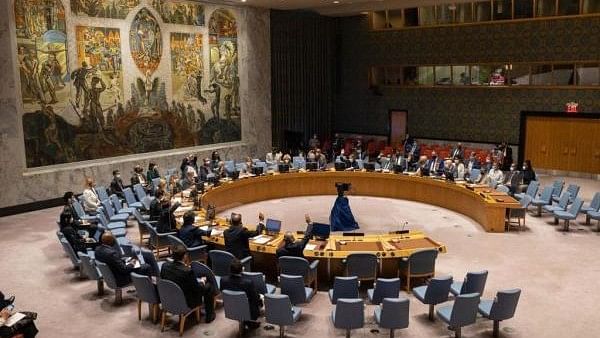
Representative image of a UNSC meeting including different nations.
Credit: PTI Photo
The Summit for the Future at the United Nations on September 22 adopted by consensus a document titled “Pact of the Future”, that calls for the “reform [of] the Security Council, recognising the urgent need to make it more representative, inclusive, transparent, efficient, effective, democratic and accountable”.
The UN Security Council has hitherto functioned with five permanent members (the ‘P5’) and 10 non-permanent members on a rotational basis. This is the first time that the need to reform it has been put down in black and white in a UN text.
The Security Council has, for the most part, proven to be ineffective, or even powerless, when it comes to stopping or preventing inter-State conflict, as two currently raging wars, and many in the past, have shown. At the UN, the pact was hailed as “groundbreaking”.
India, which has long demanded an expansion of the Security Council with a permanent seat for itself, has welcomed it as a “good beginning” and flagged the need to quickly move to “text-based negotiations” on the reforms required.
This is where the matter may slow down and come up against obstacles. The P5 set-up is a relic of the attempts to build a global governance system post-WWII and reflects the power realities of that era.
But they have – as nations enjoying the privileges of high power are wont to do -- jealously guarded their individual veto power that, in its use by one or the other, has reinforced geopolitical divisions, bloc economic and security interests, pitting them against one another.
It is the reason why the UNSC has been rendered ineffective; it is also why reforming it to allow new powers to sit at the high table seems nearly impossible.
A Group of 4 – Brazil, Germany, India and Japan – who support each other's claim to a permanent seat, proposed at the “inter-governmental negotiations on Security Council reform” in March this year that the SC be expanded by adding six new permanent members and four or five non-permanent members.
They have declared their “flexibility” on the veto issue for newly added permanent members, so that it does not become a “veto” on the reform process itself. But if the expanded body is to be effective, the very idea of any of its members having a veto on decisions affecting the world must itself be debated.
Other difficulties lie ahead, not least in deciding which countries should find place in an expanded Security Council. India's claim has been backed over the years by four of the P5 -- France, Russia, the UK and the US -- with leaders of the western alliance reiterating that support last week.
But whether they act on their promise, particularly as they are none too pleased by India's independent positions, is another matter. Prime Minister Narendra Modi, speaking at the Summit of the Future, and External Affairs Minister S Jaishankar at the General Assembly, made a strong case for the urgency of reforms.
Can the P5 agree on this among themselves and heed the call to infuse new life into the Security Council?